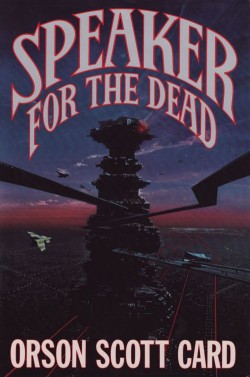 Author: Orson Scott Card
Author: Orson Scott Card
Started: 1 Nov 2009
Finished: 24 Nov 2009
280 p / 24 d
11.7 p/d
So, as I mentioned when I read Ender’s Game back in May, Brandy gave me the latest Ender book last Christmas, and I decided I needed to read the whole series again, both those I’d read before and those I hadn’t, before I read the new one. So now it was time for book two.
This picks up Ender’s story several thousand years after the events in the first book (relativistic travel allows one do do that sort of thing while still living a normal lifespan). He now is a “Speaker for the Dead” and is unraveling several mysteries, one involving the life cycle of a newly discovered alien species.
The bits about how that life cycle works, and the confusion it causes in the relationship between humans and the piggies (said other species) because of lack of understanding are very creative and interesting. This is once again a book that suffers on second reading though. Even though it has been many years since I last read this book, I remembered the critical bits that meant I knew the answers to many of the mysteries from the beginning. The figuring out what was going on was, I remember, a big part of the experience of reading the book the first time around, and that was absent the second time for me.
One other big part though, that didn’t lose quite as much impact the second time around, was the concept of the “Speaker for the Dead” itself. Basically, the idea is that this is someone who does funeral orations. But not the kind where all the good aspects of the person are praised. But rather the speaker spends a good deal of time learning about the person, digging into their secrets and their dark sides as well, and then essentially “speaks the truth” telling the story of the person’s life, from childhood to their death, but not shying away from the negative or disturbing… or from the positive either… but trying as much as possible to give an honest accounting. The good, the bad, the mediocre, the things they were proud of, the things they were ashamed of, etc… The idea being that this kind of truth telling is a more powerful thing than sugar coating, and more powerful in letting the survivors understand and move on. Even if it opens wounds, it provides opportunities for healing.
Anyway, I liked that concept when I read it the first time, and I still like it. I wouldn’t mind there being a “speaking” for me when the time comes. Of course I wouldn’t mind, I won’t be there. But I like the concept. :-)